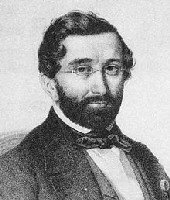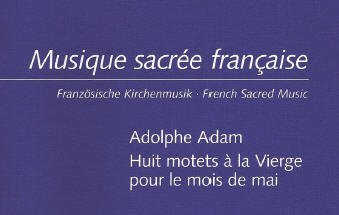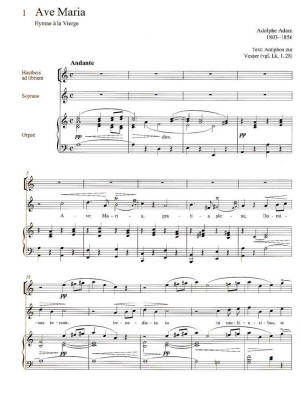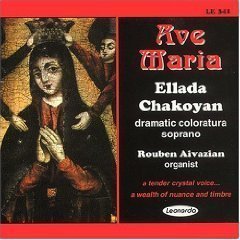Adam, Adolphe - Ave Maria, Hymne a la Vierge
 for Soprano solo + organ.
for Soprano solo + organ.
year of composition / 1st publication: c.1895
 | Composer: Adolphe Adam (1803-1856) aliases, aka: Adolphe Charles Adam Country of origin / activity: France | |
| Text author: traditional | ||
| Arranger / Editor: N/A |
| MIDI | MP3 | VID | First name | Last name | Birth | Death | comp | ID # | Title | Voicing | Instrumentation | |
|---|---|---|---|---|---|---|---|---|---|---|---|---|
| 1 | 1 | 1 | 0 | Adolphe | Adam | 1803 | 1856 | 1895 | Ave Maria (i) | S | organ | |
| 1 | 1 | 0 | 0 | Adolphe | Adam | 1803 | 1856 | 1895 | Ave Maria (ii) | cA | organ | |
| 1 | 1 | 0 | 0 | Adolphe | Adam | 1803 | 1856 | 1895 | Ave Maria (iii) | S cA | flute + organ |
No.1 in Huit Motets à la Vierge pour le mois de Mai c.1895
Available documentation:
Score: available for purchase at Carus Verlag CV 40.791/00  |  |
| My thanks and appreciation to Debra Potts for sending me this score. | |
Lyrics:
| A ve Ma ri a, gra ti a ple na, Do mi nus te cum: be ne dic ta tu in mu li e ri bus, et be ne dic tus, be ne dic tus fruc tus ven tris tu i, be ne dic tus fruc tus ven tris tu i, Je sus. | Sanc ta Ma ri a, Sanc ta Ma ri a o ra pro no bis, o ra pro no bis, pro no bis pec ca to ri bus, nunc et in ho ra, in ho ra mor tis Sanc ta Ma ri a, Sanc ta Ma ri a o ra pro no bis, o ra pro no bis. A men, a men, a men, a men, a men, a men. |
| MIDI: not available | MP3: not available |
| Play / stop MIDI |
Recording:
 | Play / stop mp3-sample CD: Ave Maria - Ellada Chakoyan |
Video - posted on YouTube:
| not available at this time | YOU could be featured here! If you or your choir perform this Ave Maria, make a video recording. Post your video on YouTube, email me the page URL and I'll embed the video in this page. |
Internet references, biography information:
| http://en.wikipedia.org/wiki/Adolphe_Adam retrieved July 09, 2013 | |
| From Wikipedia, the free encyclopedia Adolphe Charles Adam (24 July 1803 – 3 May 1856)[1]French was a French composer and music critic. A prolific composer of operas and ballets, he is best known today for his ballets Giselle (1844) and Le corsaire (1856, his last work), his operas Le postillon de Lonjumeau (1836), Le toréador (1849) and Si j'étais roi (1852) [n 1] and his Christmas carol Minuit, chrétiens! (1844), later set to different English lyrics and widely sung as O Holy Night (1847). Adam was a noted teacher, who taught Delibes[n 2] and other influential composers. Life and career Adolphe Adam was born in Paris to Jean-Louis Adam (1758–1848), who was a prominent Alsatian composer, as well a professor at the Paris Conservatoire. His mother was the daughter of a physician. As a child, Adolphe Adam preferred to improvise music on his own rather than study music seriously and occasionally truanted with writer Eugène Sue who was also something of a dunce in early years. Jean-Louis Adam was a pianist and teacher but was firmly set against the idea of his son following in his footsteps. Adam was determined, however, and studied and composed secretly under the tutelage of his older friend Ferdinand Hérold, a popular composer of the day. When Adam was 17, his father relented, and he was permitted to study at the Paris Conservatoire—but only after he promised that he would learn music only as an amusement, not as a career.[2] He entered the Paris Conservatoire in 1821, where he studied organ and harmonium under the celebrated opera composer François-Adrien Boieldieu. Adam also played the triangle in the orchestra of the Conservatoire; however, he did not win the Prix de Rome and his father did not encourage him to pursue a music career, as he won second prize.[3] By age 20, he was writing songs for Paris vaudeville houses and playing in the orchestra at the Gymnasie Dramatique, where he later became chorus master. Like many other French composers, he made a living largely by playing the organ. In 1825, he helped Boieldieu prepare parts for his opera La dame blanche and made a piano reduction of the score. Adam was able to travel through Europe with the money he made, and he met Eugène Scribe, with whom he later collaborated, in Geneva. By 1830, he had completed twenty-eight works for the theatre. Adam is probably best remembered for the ballet Giselle (1841). He wrote several other ballets and 39 operas, including Le postillon de Lonjumeau (1836) and Si j'étais roi (1852). After quarreling with the director of the Opéra, Adam invested his money and borrowed heavily to open a fourth opera house in Paris: the Théâtre National (Opéra-National). It opened in 1847, but closed because of the Revolution of 1848, leaving Adam with massive debts (Théâtre National later was resurrected under the name of Théâtre Lyrique at the Boulevard du Temple). His efforts to extricate himself from these debts include a brief turn to journalism.[1] From 1849 to his death in Paris, he taught composition at the Paris Conservatoire. His Christmas carol "Cantique de Noël", translated to English as "O Holy Night", is an international favorite, and is said to have been the first music broadcast on radio.[4] Adam is buried in Montmartre Cemetery in Paris. | |
| A biographical dictionary of musicians (ed. Theodore Baker) G. Schirmer, 1905 - 695 pages | |
| Adam, Adolphe Charles celebrated opera composer was b Paris July 24 1803 d there May 3 1856 He entered the Cons in 1817 but made little progress until taken in hand by Boieldieu in his class for composition After publishing various pf pieces he brought out the 1 act opera Pierre et Cat urine 1S29 the success of which encouraged him to produce 13 more similar works in quick succession the Postilion tie Longjumeau 1836 gaining European celebrity for its author and still keeping his name in grateful memory In all he wrote 53 theatrical works the most popular operas after the Postilion being Le Chdlet 1834 Le fidele Berger Le Brasseur de Preston 1838 Le Pot d Yvetot 1842 Ia Poufi e de Xuremberg Ca glioslro and Richard en Palestine 1S44 also the ballets Giselle Le Corsaire L ausl etc In 1847 on account of difficulties with the director of the Opera Comique A founded the Theatre National but was ruined financially by the revolution of 1848 and entered the Paris Cons as prof of composition succeeding his father who died that year. A does not rank with the foremost dramatic composers of France his style being distinguished by taking rhythms and light elegance and grace rather than forceful originality. His forte was comic opera in which he was a worthy successor of Boieldieu. | |
Page last modified: November 16, 2013
 avemariasongs
avemariasongs org
org